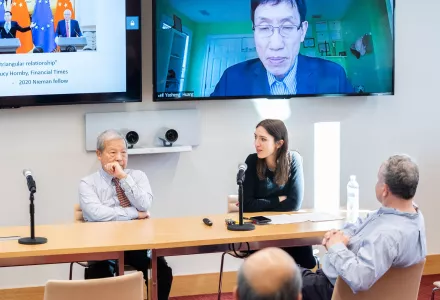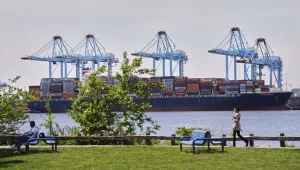
“Coronavirus is allowing people to appreciate that we cannot put all our eggs in one basket.”
- Lucy Hornby, Financial Times
China’s important ties with Europe and rising tensions with the US, in addition to the outbreak of the novel Coronavirus, will redefine the world’s economic and industrial landscape and shift the global economic epicenter from the Atlantic to the Pacific.
March 9, 2020, in Cambridge, Massachusetts, Lucy Hornby, Harvard University Nieman Fellow and Deputy Bureau Chief in Beijing for the Financial Times; Yasheng Huang, Epoch Foundation Professor of International Management and Faculty Director of Action Learning at the MIT Sloan School of Management; and Yukon Huang, Senior Fellow at the Carnegie Endowment for International Peace, Washington D.C. discussed critical issues facing the global economy and integrated supply chains in the novel Coronavirus crisis and reflected on the triangular relationship between its most powerful players — China, the European Union, and the United States — at a joint PETR-Asia Center event moderated by Maria Adele Carrai, Fellow at Harvard University’s Asia Center.
Hornby compared, contrasted, and connected the Chinese and European economies. “Chinese wages are much lower than in Western Europe and are competitive with Eastern Europe. [Additionally,] we have seen a huge surge of Chinese investment into Europe … If China does become the superpower of Eurasia, Europe will be subordinate.”
Many European nations — including Italy, Greece, the Czech Republic, and Russia — had embraced and even welcomed Chinese investment, she said, allowing China to “peel away the periphery of Europe” in its economic ascension.
Yukon Huang argued that the relationship between China and Europe would help solve the problems that exist between China and the United States.
“Europe’s trade deficit with China is much smaller than the US trade deficit with China. [..]. The value added by Europe to the Chinese economy is twice as high as that added by the US. Foreign investment in China is increasing from Europe and decreasing from the US: it doesn’t make sense for American companies to invest in China given the structure of American companies, [while] it does make sense for European companies to invest in China given the structure of European economies. In the US-China trade war, we have a prisoners’ dilemma: two equally powerful nations are challenging each other, and everyone is worse off. [It’s up to] Europe [to] break the stalemate.”
Yasheng Huang focused his remarks on the impact of the novel Coronavirus and its effects on China’s global economic rise and the triangular economic relations between China, the US, and the EU.
“The coronavirus outbreak has broad economic and political implications. The outbreak happened on Xi Jinping’s legal and administrative watch and the mismanagement of the crisis will be attributed to him. The political costs this time around are actually pretty severe as opposed to in 2003 with SARS. ”
Already the Coronavirus outbreak was having a deep impact on global economic flows, Hornby agreed. China accounts for 20% of the world’s population, but at one point it was producing 50-60% of the world’s aluminum and steel and was responsible for the lion’s share of global pollution. International capital flowed freely toward China. Now, Coronavirus is vivid proof that we “cannot put all our eggs in one basket,” especially when it comes to industry and manufacturing, she said.
This discussion was the third in the multi-part event series, “China’s Rise and the Future of the Transatlantic Relationship” designed to examine the relations between China, the EU, and the US from different vantage points co-hosted by the Project on Europe and the Transatlantic Relationship at the Harvard Kennedy School and the Asia Center at Harvard University.
Michalak, Winston Ellington. “Triangular Economic Relations: China, the EU, and the United States.” March 16, 2020


